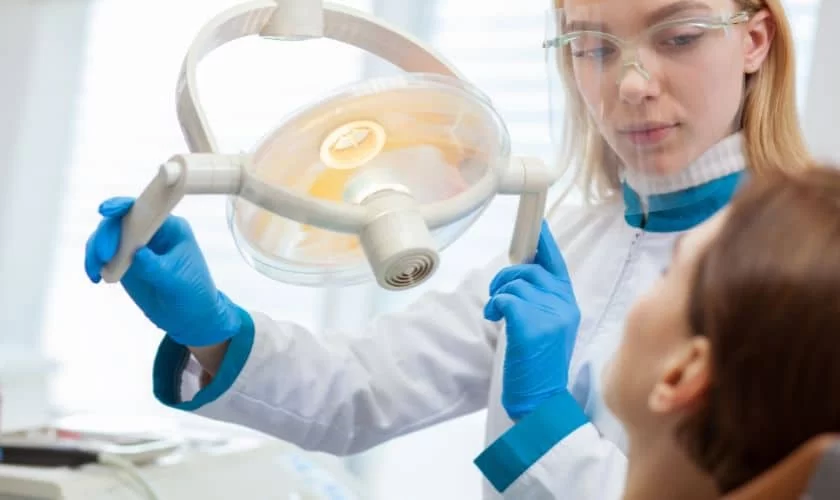
- Why Regular Oral Health Check-Ups Are Crucial
- Recommended Frequency of Oral Health Check-Ups
- Signs That Indicate You Need an Oral Health Check-Up
- How to Maintain Oral Health Between Check-Ups
Why Regular Oral Health Check-Ups Are Crucial
Oral health check-ups are essential for maintaining good overall health. Dental problems, such as cavities, gum disease, and oral cancer, may not show visible signs in their early stages. Regular visits to the dentist allow for early detection, which can help prevent serious issues from developing. Not only do these check-ups help keep your teeth and gums in great shape, but they also play a vital role in your overall well-being. Conditions like heart disease and diabetes are linked to poor oral health, which is why regular check-ups should never be overlooked.
Recommended Frequency of Oral Health Check-Ups
The American Dental Association (ADA) recommends visiting the dentist at least once every six months for a routine oral health check-up. These biannual visits help ensure that your teeth are clean, your gums are healthy, and any issues that may arise are addressed promptly. However, the frequency of check-ups can vary depending on individual oral health needs. Some people may require more frequent visits due to existing dental issues or health conditions, while others may be fine with fewer check-ups. Your dentist can recommend a schedule based on your personal dental history and needs.
1. Healthy Individuals
If you maintain good oral hygiene and have no ongoing dental issues, visiting the dentist twice a year is typically sufficient. These check-ups involve cleaning, checking for cavities, and screening for oral cancer.
2. High-Risk Individuals
People with existing dental conditions, such as gum disease or a history of frequent cavities, may need more frequent visits, such as every 3 to 4 months. Individuals with diabetes, smokers, or those who wear braces might also require more frequent check-ups to prevent complications.
Signs That Indicate You Need an Oral Health Check-Up
There are certain signs that may indicate you need to schedule an oral health check-up sooner than your regular schedule. Pay attention to any changes or discomfort in your mouth, including:
- Bleeding Gums: Gums that bleed during brushing or flossing can be a sign of gum disease, which should be addressed by a dentist.
- Persistent Bad Breath: Foul-smelling breath may indicate an underlying issue like tooth decay, gum disease, or other oral health problems.
- Tooth Sensitivity: Increased tooth sensitivity to hot or cold foods and drinks can point to worn enamel or other dental issues.
- Loose Teeth: Loose teeth or changes in the way your teeth fit together can be a sign of advanced gum disease or other serious issues.
If you notice any of these signs, it's essential to schedule an appointment with your dentist as soon as possible. Regular check-ups can help prevent these issues from worsening.
How to Maintain Oral Health Between Check-Ups
While regular check-ups are vital for maintaining optimal oral health, your daily habits also play a significant role in preventing dental issues. Brushing your teeth at least twice a day with fluoride toothpaste, flossing daily, and eating a balanced diet can help you maintain your oral health between visits. Additionally, using mouthwash and limiting sugary snacks will further protect your teeth and gums.
Good oral health is a combination of regular check-ups and proper self-care. By following your dentist’s recommendations and sticking to a consistent oral hygiene routine, you can reduce the risk of developing dental problems in the future.
For more information on maintaining your oral health or to schedule a check-up, visit Dentistry Toothtruth for expert tips and services.







 Westgate Dental Arts3.0 (2 review)
Westgate Dental Arts3.0 (2 review) Coventry Family Dental4.0 (247 review)
Coventry Family Dental4.0 (247 review) Familia Dental3.0 (1028 review)
Familia Dental3.0 (1028 review) Dr. Daniel S. Fife, DDS4.0 (31 review)
Dr. Daniel S. Fife, DDS4.0 (31 review) Dentistry At Suburban Square: Michael I. Wollock, DMD4.0 (1228 review)
Dentistry At Suburban Square: Michael I. Wollock, DMD4.0 (1228 review) Comfort Care Dental4.0 (1156 review)
Comfort Care Dental4.0 (1156 review) The Importance of Oral Health Education During Pregnancy for a Healthy Pregnancy
The Importance of Oral Health Education During Pregnancy for a Healthy Pregnancy Why Skipping Dental Checkups Can Lead to Bigger Oral Health Problems
Why Skipping Dental Checkups Can Lead to Bigger Oral Health Problems Best Tips for Brushing Your Teeth Properly for Healthy Gums: Essential Techniques for Oral Health
Best Tips for Brushing Your Teeth Properly for Healthy Gums: Essential Techniques for Oral Health Advantages of Porcelain Dental Restorations
Advantages of Porcelain Dental Restorations How Can Diabetes Cause Tooth and Gum Problems? Preventing and Managing Oral Health Issues
How Can Diabetes Cause Tooth and Gum Problems? Preventing and Managing Oral Health Issues Healthy Habits for Promoting Good Oral Health and Hygiene: Tips for a Healthy Smile
Healthy Habits for Promoting Good Oral Health and Hygiene: Tips for a Healthy Smile